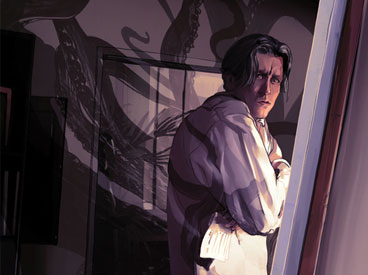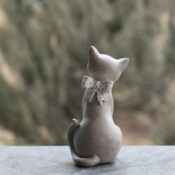The woman was dressed in sensible leather shoes and a fancy white blouse that fell below the waist and over baggy linen pants. A large ruby adorned the ancient-looking pendant that hung around her neck. Her skin seemed oddly smooth, though it showed no sign of clinical or chemical refurbishment. She wasn’t a young woman, yet nor was it possible to determine just how old she might be. Her bottomless dark eyes seemed to hold eternities of experience.
“I’m Alice Raskin. Mrs. Raskin,” she said, in response to the question Hogarth hadn’t asked yet. She flashed a smile. “I’m doom!”
“You’re what?” said Hogarth, sputtering into the cup of water that Nora Vazquez had handed him.
“Your doom,” said Mrs. Raskin, her smile revealing the kind of dentistry Hogarth could no longer afford. “Unless you start behaving yourself.”
Hogarth felt dazed, confused, as if the rules of time had collapsed or folded in on themselves. Who was this woman?
“The garage doors were open. You found the Mortensen in there,” said Mrs. Raskin. “You slipped it behind a bunch of worthless posters, made a deal with one of the kids for $5, and then tried to get change for $20, even though you paid with a $10 bill.”
Hogarth gave a silent inward yelp.
“You were seen,” said Mrs. Raskin.
“No I wasn’t,” Hogarth couldn’t stop himself blurting out, throwing his mind back to the events of that yard sale. There’d been the kids with their lemonade stand, a couple of young hipsters, and that weird guy with the bright orange motorcycle helmet who’d been snatching at the CDs and DVDs and had probably stolen a few. But the hipsters had left, and the creep had puttered away on his sad-looking moped or scooter or whatever, before Hogarth found and grabbed the Mortensen.
“No actual human person saw you,” said Mrs. Raskin, as though she’d just read his mind.
“Yeah, right, must have been the little pixies on the roof,” said Hogarth, willing himself to rally.
“An opportunist and a determined rationalist,” said Mrs. Raskin, touching Hogarth’s shoulder. Her gloved fingers were surprisingly firm and strong. “I admire Mortensen’s work, myself, in a way. Some people consider him dark. I think he’s amusing. He saw that the battleground is complicated. That all symbols are symbols of something and not of nothing. That evil exists and can be summoned.”
Her casual certainty irritated Hogarth and made him uneasy too.
“It’s a question of self-preservation,” said Mrs. Raskin, a fire seeming to glow within the frozen black lakes of her eyes. “I want you to be selfish. Should be a cinch for an oaf like you.”
“What the heck’s that supposed to mean?” said Hogarth, huffing and puffing, watching Mrs. Raskin fish in her snazzy leather tote bag for a little black notebook covered in fiery Day-Glo stickers.
The notebook opened, and Hogarth caught a glimpse of neatly etched numbers, letters, hieroglyphs, and a blurred figure that seemed actually to crawl across the page.
“Yes, that should do it nicely,” said Mrs. Raskin, pressing shut the notebook with an odd reverence. Her lips began to move, and, though no sound came from her mouth, her eyes exhaled a strange orange heat. Hogarth’s nostrils flared, pricked by an acid smell.
The doors to the street burst open, letting in a blast of traffic noise and a fierce wind that gusted through the gallery. All of a sudden Nora Vazquez was chasing the papers, Post-its, and documents that flew from her desk and rose spinning like confetti. The straggles of Hogarth’s graying hair, blown back over his shoulder by the quick fury of the wind, threatened to rip his scalp from his skull. Hogarth’s yelp was outward this time.
“Shit!”
The wind died as suddenly as it had come. Hogarth’s ears pinged in the silence.
“Just a minor sprite,” he heard Mrs. Raskin saying. “By way of warning.”
Hogarth took a deep breath. “You must think I’m some kind of sucker,” he said. “You expect me to believe that you caused that?”
“Of course.”
“What a load of baloney!”
Mrs. Raskin slashed his face with a rapid glance. “Produce that picture. Return it,” she said.
Hogarth stuck out his tongue at her.
Mrs. Raskin’s expression was fixed and placid; her eyes, though, were totally blank and dark. “You’ve been warned, and your time has been allotted,” she said. “You have until 10 o’clock tomorrow morning. Then the next demon will suck out your brains.”
Hogarth wasted no time. With his iPhone he took several pictures of the Mortensen painting and spent the rest of the afternoon driving to and fro across Santa Monica, visiting every art dealer he knew. It was after six when he came back through the doors of his own gallery, and he was glad to see that Nora Vazquez was still there, seated at her desk, features bathed in the ghostly blue light of her computer screen as dusk fell. Hogarth felt tipsy with excitement. His sore gums nagged at him but he couldn’t help boasting, “I’ve sold the Mortensen for 15 grand. Drake Seger will come around first thing tomorrow to firm up the deal. He’s got a die-hard Mortensen collector up in Ojai.”
He was already rubbing his hands together in that characteristic way of his when he caught Nora’s glance.
“What?” said Larry Hogarth.
“You need to take a look at the picture.” She moved her narrow shoulders in a puzzled shrug. “It’s weird. It’s changed.”
A gale of nervous laughter exploded from Hogarth’s lips. “Changed? How? Impossible!” he said.
Nora Vazquez turned out to be right. The Mortensen painting, propped just where Hogarth had left it, against an office chair to the side of his desk, did indeed strike his eye differently. At first he couldn’t figure it out; then he saw, yes, that the outlines of the hellish creature chasing Jacob up his ladder had grown even more vague, ever more difficult to distinguish, as though the paint in that part of the artwork were disappearing, leaving just gold leaf surrounding a small, empty section of canvas.
Crouching down for a closer inspection, he caught a faint whiff, not of oily paint, but of vinegar, a smell such as that had wafted from Mrs. Raskin’s notebook when she pressed it shut.
Hogarth would not admit to himself that the sudden shiver he felt was of fear and foreboding. Instead he asked, “You got a boyfriend, Nora?” ™
“I do.”
“What’s he like?”
“Older than me,” Nora said with an eager nod. “He’s a cop.”
Hogarth stood up straight, surprised. “Really? A cop.”
Nora’s big glossy eyes twinkled and shone. “Yeah, he’s in his late 20s already. And he’s a Christian.”
Hogarth failed to control a smirk. “He takes you to church?”
“Sometimes.” Her fingers trailed across the rosebud etched into her shoulder.
“You believe in all that superstitious claptrap?”
“I don’t know what I believe,” said Nora, adding with sudden decision. “I think you should give back this picture.”
“I bought it. It’s mine.”
“Mrs. Raskin didn’t seem to think so.”
“What do you know about that?”
“I googled her.”
“Googled her?”
“There are pictures of her with Governor Schwarzenegger, and Salma Hayek, and, Oprah.” Nora moved her head with another of those eager tilts. “And she wrote a book. Grimoires – A History of Magic Texts and How They Can Change Your Life. And there was something else. Something weird.”
Hogarth felt fidgety and oppressed, snared.
“I went to Amazon to check on the star rating for her book and an ad just popped up out of nowhere. It said – ‘Larry Hogarth. Allotted one day.’ It was only there for a couple of seconds.”
“Oh sure. What were you smoking, Nora?”
“It was real.”
Hogarth wanted to scream. Instead he launched a furious kick at the wastepaper basket with his left foot. His arms punched and flailed as if at an invisible swarm of bees. His body twisted in an involuntary salmon-leap of rage. “Damn!” he said. “Damn. Damn. Damn.”
“You’d better give back that picture. Otherwise I think she’s gonna, like, totally flame you.”
Hogarth turned on Nora Vazquez with a snarl. “Don’t you have a date with the God-squader?”
That night Hogarth put himself to sleep with a Xanax and a tumbler two-thirds filled with Jack Daniels. He dreamed that he was in the ocean, swimming into a dead horse, drowning in debris from a tsunami. He dreamed that he was attacked by a snouty, dog-like dwarf with snarling teeth. He dreamed that he was pursued by a horrible hopping creature in sensible shoes, and overtaken, and torn in pieces. He woke before dawn and didn’t bother to try to sleep again. Instead he shaved, showered, made himself a breakfast of bacon and eggs and black coffee, spent time with the newspaper, and drove across town to be ready in time for his appointment at the gallery with Drake Seger, the dealer buying the Mortensen. The Los Angeles morning was clear and brilliant, yet cool with a breeze from the ocean that made the palm trees nod their heads, and traffic was light. It seemed to Hogarth as if he were cut off from the rest of the world, as if something ill-defined and impalpable had stepped in between him and his fellow-travelers on the thoroughfares in downtown Santa Monica. He felt, somehow, as though he were ceasing to be.
“Hungover,” he said, seeing listless eyes looking back at him in the driver’s mirror. “Should never have taken that damned Xanax.”
Become a Saturday Evening Post member and enjoy unlimited access. Subscribe now



